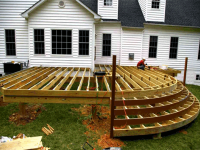Comparing two tires, which would you pick?
I am inclined to go with all weather because of the stark contrast between handling and performance for conditions that coexist in a season.
In snow and ice, there is nothing better than dedicated "snow" tires. If I were in Maine I'd get a set of those on rims, then go for performance type all season tires on the regular rims the car cane with - you may as well enjoy the drive during the months you can!
The inverse is true for snows vs regular tires - for snows you want to downsize if possible, go narrower and go smaller diameter. If you call Tirerack they'll advise you well
When it snows here, we are looking at two to three days of snow on the road. It is usually plowed by the 2nd day and melted by 5th day. Multiply this by an average of 3 storms per season.
I would go for all seasons.... however, if you are on the road for long trips -- sales job or the like, then dedicated snow tires.
For cars that are front wheel drive or all wheel drive, snow tires won't improve things much over all season radials. If you have rear wheel drive, snow tires should improve things significantly.
i was surprised by the comment on mileage. While I own a truck, not a car, I have been running about 70-80k before replacing. Of course it is rear wheel, not 4x4, but again i was surprised you are only getting 30k.
Rob_Sandow said:
For cars that are front wheel drive or all wheel drive, snow tires won't improve things much over all season radials. If you have rear wheel drive, snow tires should improve things significantly.
I disagree strongly! They make a big difference. But you must put them on all four wheels.
Like Tom, I agree this just isn't so. Braking, acceleration, Cornering are measurably improved.
Tom_Reingold said:
Rob_Sandow said:
For cars that are front wheel drive or all wheel drive, snow tires won't improve things much over all season radials. If you have rear wheel drive, snow tires should improve things significantly.
I disagree strongly! They make a big difference. But you must put them on all four wheels.
peteglider said:
Like Tom, I agree this just isn't so. Braking, acceleration, Cornering are measurably improved.
Tom_Reingold said:
Rob_Sandow said:
For cars that are front wheel drive or all wheel drive, snow tires won't improve things much over all season radials. If you have rear wheel drive, snow tires should improve things significantly.
I disagree strongly! They make a big difference. But you must put them on all four wheels.
Only in actual snow are snow tires better. In slush, rain, ice, or clear pavement I wou!d rather have all season tires.
Please, believe in science - CR and Tirerack have shown conclusively the value of snow tires. They have a softer compound rubber that is much better in snowy and icy conditions for braking, cornering, and accelerating.
During a winter storm Your car with 4 winter tires will easily make it up the steep South Orange Ave hill, whether it's AWD or FWD! Your vehicle with factory tires will be inferior in every way.
But let's be smart, too. The best thing in winter is to stay home or come home early when a storm hits, and, dear God, don't run out to Dunkin Donuts before the roads are cleared, salted, and sAnded.
[so a sideways thanks to all those who are compelled to drive when it's not safe, I've got some incredulous video of bumper cars on the hill I live on  ]
]
peteglider said:
But let's be smart, too. The best thing in winter is to stay home or come home early when a storm hits, and, dear God, don't run out to Dunkin Donuts before the roads are cleared, salted, and sanded.
Amen!
I so appreciate the discussion. You see I am buying these for my 23 year old son, whom I do not expect to be driving a lot in the snow, but we are in Portland, Maine now. When I travel back to SOMA, fairly frequently, I don't use his front wheel drive Volvo station wagon, 2002, V70, 100K miles. My car is AWD.
I am torn between thinking that there is more slush on the road then snow and ice for most of the winter, and it seems that the best snow tires are the worst wet pavement tires. I'm sure there's a scientific explanation. There are however, a few storms in which we find ourselves leaving home in actual snow, or dealing with ice. Hence the dilemma. After my CR and Tire Rack research, I am tending toward studded Breakstone Blizzard tires (not sure why dedicated wheels were recommended here in this thread, but I truly know nothing) for winter, and Micheline Premier A/S for non-winter months. I spent 4 hours on this yesterday, and I know I overthink things, but good grief. And I do appreciate all of your thoughts.
I remember my husband insisting that we drive from SOMA to Maine in a blizzard, an actual can't-see-the-road blizzard. We saw at least twenty cars in separate spinouts on the way up. We drove 25 miles an hour without snow tires, and without AWD. It was unbelievable, one of the most harrowing experiences of my life with a toddler and baby in the car. So although I would hope never to make that mistake again, I am trying to protect against worst case scenario and more common road conditions.
By the way, apparently with some (maybe all?) snow tires, we will have to order a 'steering limiter' from Volvo otherwise the tires could thump against something (fender?). Geez.
I'm learning a lot. Sears has a 100K mile tread wear warranty for its Roadhandler tires, but when I looked at reviews, people complained about sliding on wet roads.
It's times like these when in the swamp of small details that I kind of wish I were more of a big picture person.
I will add a little to try to give you some background. To get a longer tread life the rubber has to be more stiff, which makes it grip a little less than a softer rubber compound. Softer, of course, will wear faster but gives a better grip. The second set of wheels is just to save time and money when you swap your tires every spring and fall if you go the snow tire route. Around here it is about $20 per tire to mount and balance, so that is $160 per year. Just jacking up the car and swapping the already mounted tires can be done at home or cheaply. You are storing either 4 tires off the rims or 4 tires with rims.
OK if you expect this car (with any driver) to truly avoid snowy driving, then get all-season or, even better, 3-season tires. All season tires have wimpy snow traction that compromises other criteria. If pulling the car through one or two snowy days a year is important, then get snow tires. Given that you'll be driving in winter weather, buy four rims so you can swap the tires easily, and you won't have to pay a mechanic to do it.
Sponsored Business
Promote your business here - Businesses get highlighted throughout the site and you can add a deal.
Featured Events
-
Stephen Whitty Presents - Hometown Movie Stars: The Celebrated Actors Of CHS
May 6, 2024 at 7:00pm
-
'Beethoven's Wrong Note: A Steampunk Opera'
May 12, 2024 at 2:00pm































So I have been staring at consumer report ratings of tires. They tested 195. I was planning to buy a set of all season and a set of winter/snow, but as I looked at the ratings I noticed that the tires that had excellent ratings for snow and ice braking, had fair or poor ratings for wet braking. In studying the all season tires, there are a few that have good or very good for all categories: snow, ice, wet braking. I am thinking that there is enough wet braking in winter to make me want to go with the all season. What do you all think?
By the way, our tires are bald after only 30K, which seems lackluster at best.
Appreciate your thoughts.